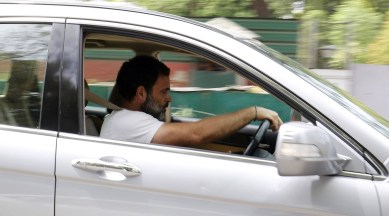Stay updated with the latest - Click here to follow us on Instagram
Defamation case: Rahul Gandhi to move HC as plea for stay on conviction rejected
Additional Sessions Judge Robin P Mogera said Gandhi’s remark about thieves with the Modi surname “would definitely have caused mental agony” and harmed the reputation of complainant Purnesh Modi, BJP MLA from Surat West.

Congress leader Rahul Gandhi’s application for staying the March 23 order convicting him in a 2019 defamation case that led to his disqualification as a Member of Parliament was rejected Thursday by the Surat District and Sessions Court.
Additional Sessions Judge Robin P Mogera said Gandhi’s remark about thieves with the Modi surname “would definitely have caused mental agony” and harmed the reputation of complainant Purnesh Modi, BJP MLA from Surat West.
Gandhi’s lawyer Kirit Panwala said the sessions court’s order will be challenged in the Gujarat High Court. He also said that the sessions court had set May 20 as the date to begin the final hearing on his appeal against the lower court order.
In New Delhi, the Congress called the order rejecting Gandhi’s application as “devoid of valid, sustainable legal reasoning” and “erroneous”. It said the judgment will be challenged in the Gujarat High Court.
Congress leader and lawyer Abhishek Singhvi said “the conviction has been upheld, contrary to all basic and elementary principles of law”.
“The judgment will be challenged in accordance with law in the very near future. It will be challenged in the High Court. We are confident that superior courts with Constitutional power of judicial review, namely the High Court and the Supreme Court, have the power and will set right these legal errors found in these two judgments,” Singhvi said.
Dismissing Gandhi’s application for a stay on the conviction – he was also sentenced to two years in prison by by Chief Judicial Magistrate H H Varma on March 23 – ASJ Mogera said Gandhi was an MP and president of the second largest political party and “should have been more careful with his words which would have large impact on the mind of people”.
Upholding the CJM court’s verdict as “well reasoned”, he said “it transpires that the appellant had made certain derogatory remarks against the Hon’ble Prime Minister Shri Narendra Modi in general public and further compared the persons having Modi surname with thieves and the complainant is also having surname of Modi”.
“Any defamatory words coming from the mouth of appellant are sufficient enough to cause mental agony to the aggrieved person. In this case, by uttering defamatory words viz. comparing persons having surname ‘Modi’ with thieves would definitely have caused mental agony… harm the reputation of the complainant who is socially active and dealing in public,” he said.
“I do not agree with the objections raised by Mr Cheema, lead senior advocate, with regard to maintainability of the complaint,” he said.
Senior Advocate R S Cheema had represented Gandhi in the sessions court on April 13 when the matter was last heard.
The ASJ, in his order, said, “Community as such may not have a reputation, but the reputation will only be of individual members. When the defamatory matter affects each and every member of an ascertainable class or group, each of them or all of them could set the law in motion.”
The sessions court was of the opinion that Gandhi had “not made out any case to suspend the conviction recorded against him” and stated that the Supreme Court, in a number of pronouncements, had held that the powers accorded under Section 389 (1) of CrPC to suspend/stay the conviction “is required to be exercised with caution and circumspection and if such power is exercised in a casual and mechanical manner, the same would have serious impact on the public perception on the justice delivery systems and such order will shake public confidence in judiciary”.
The order stated: “I hold that the Ld. counsel for the appellant has failed in demonstrating that by not staying the conviction and denying an opportunity to contest the election on account of disqualification u/s 8 (3) of the Representation of the People Act, 1951, an irreversible and irrevocable damage is likely to be caused to the appellant (Gandhi)”.
Purnesh Modi’s counsel Harshit Tolia told mediapersons, “The convict failed to establish (his case as) the rarest of rare for exceptional circumstances. The court had also taken into consideration the Supreme Court judgments and Gujarat High Court order put forward by us before the courts. When it comes to MLA or MP, they should be careful, and they cannot claim any exceptional circumstances mainly on the basis of them being MLA or MP. They should be treated on par with all citizens of India.”